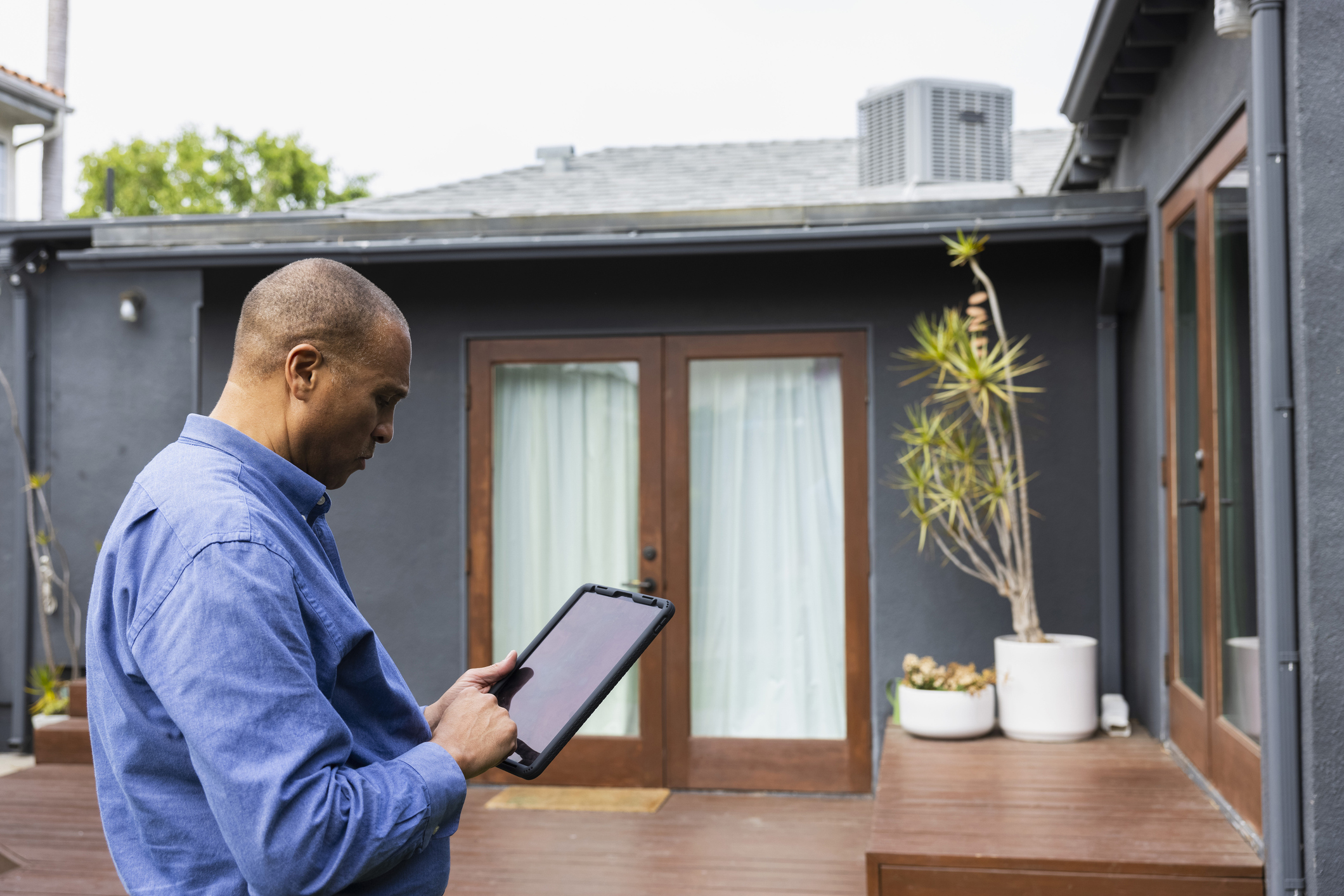I'm 65 and My Property Taxes and Insurance Keep Going Up. How Can I Afford My House in Five Years?
The costs of homeownership may continue to rise in retirement. Here's how to manage that.


Profit and prosper with the best of Kiplinger's advice on investing, taxes, retirement, personal finance and much more. Delivered daily. Enter your email in the box and click Sign Me Up.
You are now subscribed
Your newsletter sign-up was successful
Want to add more newsletters?

Delivered daily
Kiplinger Today
Profit and prosper with the best of Kiplinger's advice on investing, taxes, retirement, personal finance and much more delivered daily. Smart money moves start here.

Sent five days a week
Kiplinger A Step Ahead
Get practical help to make better financial decisions in your everyday life, from spending to savings on top deals.

Delivered daily
Kiplinger Closing Bell
Get today's biggest financial and investing headlines delivered to your inbox every day the U.S. stock market is open.

Sent twice a week
Kiplinger Adviser Intel
Financial pros across the country share best practices and fresh tactics to preserve and grow your wealth.

Delivered weekly
Kiplinger Tax Tips
Trim your federal and state tax bills with practical tax-planning and tax-cutting strategies.

Sent twice a week
Kiplinger Retirement Tips
Your twice-a-week guide to planning and enjoying a financially secure and richly rewarding retirement

Sent bimonthly.
Kiplinger Adviser Angle
Insights for advisers, wealth managers and other financial professionals.

Sent twice a week
Kiplinger Investing Weekly
Your twice-a-week roundup of promising stocks, funds, companies and industries you should consider, ones you should avoid, and why.

Sent weekly for six weeks
Kiplinger Invest for Retirement
Your step-by-step six-part series on how to invest for retirement, from devising a successful strategy to exactly which investments to choose.
Homeowners are often advised to try to pay off their mortgages ahead of retirement. That way, they'll have one less expense to contend with once they move over to a fixed income.
But while shedding a mortgage payment could free up room in your budget as a retiree, that doesn't mean you won't have other homeowner expenses to deal with, like property taxes, maintenance and insurance.
The problem is that even with a paid-off home, your costs of ownership could rise in retirement, causing financial stress and making it difficult to keep up. It's important to understand the costs of continuing to own a house — and to take steps to protect yourself financially when possible.
From just $107.88 $24.99 for Kiplinger Personal Finance
Become a smarter, better informed investor. Subscribe from just $107.88 $24.99, plus get up to 4 Special Issues

Sign up for Kiplinger’s Free Newsletters
Profit and prosper with the best of expert advice on investing, taxes, retirement, personal finance and more - straight to your e-mail.
Profit and prosper with the best of expert advice - straight to your e-mail.
Don't assume you can't fight your property taxes
In August, the Federal Housing House Price Index measured a 2.9% increase in U.S. home values on a year-over-year basis. When home values rise, property tax bills tend to follow suit, which can be a huge problem for retirees on a budget.
That's why Colton Pace, co-founder and CEO at Ownwell, a property tax appeal service, says older homeowners need to be informed about property tax relief programs.
"In most states, seniors 60 or 65 and older can lower their property taxes through homestead exemptions and property tax freeze programs," he says.
"For example, in Texas, homeowners can combine a general homestead exemption with a senior exemption and a tax ceiling that freezes school district taxes once they reach 65," Pace continues. "Florida, another popular state for seniors and retirees, offers a similar setup."
If you're older, it pays to check with your state's Department of Revenue or Division of Taxation to see what programs you might qualify for. Your local tax assessor may also have that information.
And remember, even if you don't qualify for a property tax freeze, you can always appeal your property taxes on the basis that your home assessment is too high.
Pace also points out that recent changes to the SALT (state and local tax) deduction could spell relief for some homeowners in high-tax states.
"Under the One Big Beautiful Bill Act, the SALT deduction cap was temporarily raised through 2029 to $40,000," Pace explains. The previous limit was $10,000.
However, he warns, "You can only deduct property taxes if you itemize deductions on your federal tax return." There are also income limits associated with this new rule, though they're quite high.
Homeowners in states that include Connecticut, New York, New Jersey, Massachusetts and California may benefit the most from this change, according to the Bipartisan Policy Center.
Keep shopping for homeowners insurance
Homeowners insurance can be a huge expense for older homeowners – especially when home insurance costs keep going up. Bankrate reports that the average U.S. homeowners policy costs $2,408 per year for a $300,000 dwelling limit.
If you live in a state where homeowners insurance costs keep rising (like Florida, where natural disasters are all too common), or if your personal costs keep going up for some reason, it's important to shop around for a policy every year. You may be eligible for a discount based on your age or other factors.
Budget carefully for maintenance
Although property tax and insurance costs can rise from year to year, on a 12-month basis, they're usually locked in, making it easier to budget as a retiree. It's maintenance and repairs that often push older homeowners to their breaking point.
State Farm says a good rule of thumb is to set aside 1% to 4% of your home's value for maintenance each year. But as your home value rises, that requires you to continuously increase your budget.
That, however, may not be a bad thing, since homes tend to need more work as they get older. And if your home is older already, you may need to start with the upper end of that 1% to 4% range.

If you want to make sure you'll be able to afford to stay in your home long-term, you may want to create an emergency fund for home repairs and maintenance specifically. Generally speaking, it's a good idea for retirees to hold enough cash to cover one to two years of bills in case there's a market event that sends portfolio values plummeting. Having dedicated funds for home-related costs takes some of the pressure off.
As Pace says, "All homes require upkeep, ranging from affordable fixes like deep cleaning to more expensive jobs like roof or foundation repairs. Ignoring urgent needs can lead to hazards and bigger bills down the road."
Pace says you may also want to be careful when making home upgrades – something you may be inclined to do as a retiree if you'll be spending more time at home.
"Adding a room or installing a pool will likely increase your home's assessed value and raise your property taxes, which can further deplete your retirement savings," he explains.
It's a matter of priorities
As a retiree who owns a home, it's best to expect that your costs will rise continuously from year to year. There are steps you can take to mitigate that, like looking into property tax programs, shopping for homeowners insurance annually, and having separate funds for maintenance and repairs.
But at the end of the day, if your home-related expenses are eating too heavily into your budget, there may come a point when downsizing makes sense.
Ultimately, you'll need to ask yourself what takes priority – flexibility in your budget, or staying put. There's no right or wrong answer, but it pays to consider a move if the stress of keeping up with your home outweighs the benefits of living in it.
Related Content
Profit and prosper with the best of Kiplinger's advice on investing, taxes, retirement, personal finance and much more. Delivered daily. Enter your email in the box and click Sign Me Up.

Maurie Backman is a freelance contributor to Kiplinger. She has over a decade of experience writing about financial topics, including retirement, investing, Social Security, and real estate. She has written for USA Today, U.S. News & World Report, and Bankrate. She studied creative writing and finance at Binghamton University and merged the two disciplines to help empower consumers to make smart financial planning decisions.
-
 Nasdaq Leads a Rocky Risk-On Rally: Stock Market Today
Nasdaq Leads a Rocky Risk-On Rally: Stock Market TodayAnother worrying bout of late-session weakness couldn't take down the main equity indexes on Wednesday.
-
 Quiz: Do You Know How to Avoid the "Medigap Trap?"
Quiz: Do You Know How to Avoid the "Medigap Trap?"Quiz Test your basic knowledge of the "Medigap Trap" in our quick quiz.
-
 5 Top Tax-Efficient Mutual Funds for Smarter Investing
5 Top Tax-Efficient Mutual Funds for Smarter InvestingMutual funds are many things, but "tax-friendly" usually isn't one of them. These are the exceptions.
-
 Quiz: Do You Know How to Avoid the 'Medigap Trap?'
Quiz: Do You Know How to Avoid the 'Medigap Trap?'Quiz Test your basic knowledge of the "Medigap Trap" in our quick quiz.
-
 We Retired at 62 With $6.1 Million. My Wife Wants to Make Large Donations, but I Want to Travel and Buy a Lake House.
We Retired at 62 With $6.1 Million. My Wife Wants to Make Large Donations, but I Want to Travel and Buy a Lake House.We are 62 and finally retired after decades of hard work. I see the lakehouse as an investment in our happiness.
-
 Social Security Break-Even Math Is Helpful, But Don't Let It Dictate When You'll File
Social Security Break-Even Math Is Helpful, But Don't Let It Dictate When You'll FileYour Social Security break-even age tells you how long you'd need to live for delaying to pay off, but shouldn't be the sole basis for deciding when to claim.
-
 I'm an Opportunity Zone Pro: This Is How to Deliver Roth-Like Tax-Free Growth (Without Contribution Limits)
I'm an Opportunity Zone Pro: This Is How to Deliver Roth-Like Tax-Free Growth (Without Contribution Limits)Investors who combine Roth IRAs, the gold standard of tax-free savings, with qualified opportunity funds could enjoy decades of tax-free growth.
-
 One of the Most Powerful Wealth-Building Moves a Woman Can Make: A Midcareer Pivot
One of the Most Powerful Wealth-Building Moves a Woman Can Make: A Midcareer PivotIf it feels like you can't sustain what you're doing for the next 20 years, it's time for an honest look at what's draining you and what energizes you.
-
 I'm a Wealth Adviser Obsessed With Mahjong: Here Are 8 Ways It Can Teach Us How to Manage Our Money
I'm a Wealth Adviser Obsessed With Mahjong: Here Are 8 Ways It Can Teach Us How to Manage Our MoneyThis increasingly popular Chinese game can teach us not only how to help manage our money but also how important it is to connect with other people.
-
 Looking for a Financial Book That Won't Put Your Young Adult to Sleep? This One Makes 'Cents'
Looking for a Financial Book That Won't Put Your Young Adult to Sleep? This One Makes 'Cents'"Wealth Your Way" by Cosmo DeStefano offers a highly accessible guide for young adults and their parents on building wealth through simple, consistent habits.
-
 Global Uncertainty Has Investors Running Scared: This Is How Advisers Can Reassure Them
Global Uncertainty Has Investors Running Scared: This Is How Advisers Can Reassure ThemHow can advisers reassure clients nervous about their plans in an increasingly complex and rapidly changing world? This conversational framework provides the key.